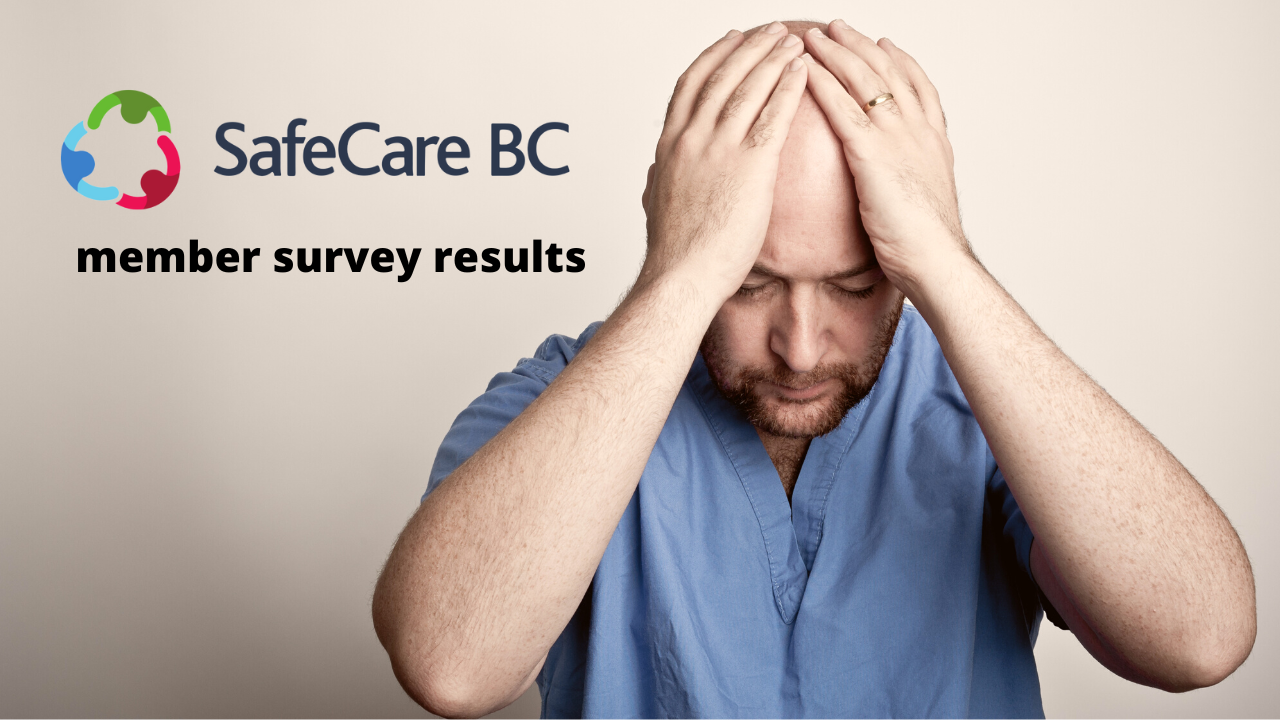SafeCare BC, our partner organization responsible for occupational health and safety in the continuing care sector, has recently released a comprehensive study on top health and safety concerns. The results revealed that mental health stress has significantly risen as a top concern in the workplace. Read below for the release and an op-ed by SafeCare BC CEO Saleema Dhalla.
+++
BURNABY – A recent SafeCare BC member survey revealed that 60 percent of the nearly 750 respondents said the mental health and wellbeing of staff was their top health and safety concern. This was followed by client or resident aggressive behaviors towards staff (42%) and injuries related to caring for those with dementia (37%).
Digging deeper into the survey results, almost one-third of respondents cited workplace bullying and incivility as a top health and safety concern. Without a doubt, this impacts one’s health and wellbeing, and can increase the risk of workplace injuries.
“Incivility isn’t unique to healthcare. Unfortunately, it festers across society,” says Saleema Dhalla, CEO, SafeCare BC, the health and safety association for 30,000 continuing care workers across BC. “We need to put the care back in healthcare, because these workers deserve our support more than ever. We owe it to them to continue investing in programs and resources that support their wellbeing.”
Read more of the official release on the SafeCare BC website and check out the infographic showing an overview of the survey results.
+++
Opinion: Putting the care back in healthcare
SafeCare BC member survey reveals mental health of care workers top health and safety concern
By Saleema Dhalla
To suggest that healthcare workers have borne the brunt of the COVID-19 pandemic is stating the obvious. As things begin to feel more normal in society—we’re gathering in large numbers at sporting and cultural events, we’re traveling, and restaurants are full again—we can easily forget that the lingering effects of the pandemic are still being felt by healthcare workers

The very people who have been caring for us and our loved ones, day in and day out—the people we called heroes and banged pots for every evening—are tired and burnt out and struggling with their mental health and wellbeing.
It’s not surprising then that a recent survey of our members, (including those working in long-term care, home and community care, assisted and independent living, and kinesiology) revealed that 60 percent of the nearly 750 respondents said the mental health and wellbeing of staff was their top health and safety concern. This was followed by client or resident aggressive behaviors towards staff (42%) and injuries related to caring for those with dementia (37%).
Like a lot of sectors, healthcare is challenged by staffing shortages. This places a huge burden of fatigue on workers, who are already stressed about bringing COVID into their workplaces or bringing the virus home to their own families.
When we dig a bit deeper into the survey results, we learn that almost a third of respondents cite workplace bullying and incivility as a top health and safety concern. Without a doubt, this impacts one’s mental health and wellness, and can increase the risk of workplace injuries.
Incivility isn’t unique to healthcare. Unfortunately, it festers across society. But we owe it to our workers to invest in mental wellness and psychological safety, in the same way we value physical safety. We need to continue devoting resources to mental health programs for healthcare workers. They deserve our support more than ever.
We recently renewed the Care for Caregivers mental health portal and Care to Speak online and telephone chat service, which we co-founded in partnership with the Canadian Mental Health Association and the Ministry of Mental Health and Addictions. We hear often from our members how important these free resources are.
Organizations have a responsibility to create a psychologically safe workplace. We know that some of our member organizations are already committed to this; others need to follow. Incivility is insidious in the way it can seep in and take hold in a workplace. Sometimes, we’re not even aware our own behaviours can lead to incivility.
From some of the work we’ve done on workplace civility, we’ve learned that the solutions aren’t difficult. Management and staff need to work together to create a respectful workplace. This is done by promoting conflict resolution and respectful communications between staff, and for leaders to be available to help staff work through conflicts that arise in the moment.
Discourage gossip and negative talk about team members. Create a positive culture of looking for ‘the good’ in people and behaviours rather than ‘focusing on the bad’. Encourage staff to talk issues through respectfully and in private. Hold sessions where staff demonstrate disrespectful and damaging behaviours. And inspire kindness.
If we care about our people. If we want to attract talent. If we want to be an employer of choice, we must invest in the mental wellness of our staff and create a workplace that people want to come to, rather than a place they want to leave. We need to put the care back into healthcare.
Learn more at www.careforcaregivers.ca
Saleema Dhalla
CEO, SafeCare BC
Listen to Saleema’s interview with Radio NL here.




